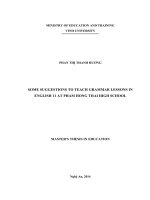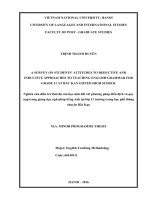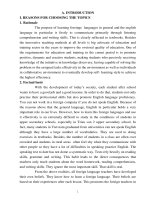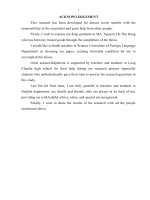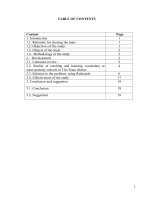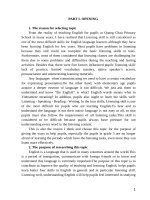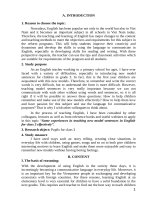Some ways to teach new vocabulay for grade 6 at nguyen hong le secondary school
Bạn đang xem bản rút gọn của tài liệu. Xem và tải ngay bản đầy đủ của tài liệu tại đây (2.53 MB, 21 trang )
THANH HOA DEPARTMENT OF EDUCATION AND TRAINING
SAM SON EDUCATION AND TRAINING DEPARTMENT
EXPERIENCE INNOVATION
SOME WAYS TO TEACH NEW VOCABULARY
FOR GRADE 6 AT NGUYEN HONG LE
SECONDARY SCHOOL
Performer : Trinh Thi Viet Nga
Position
: Teacher
Working place
: Nguyen Hong Le Secondary
School
Experience innovation of subject: English
THANH HOA, 2019
1
1. INTRODUCTION
1.1. The reason for choosing the topic
Currently, English has become the common language throughout the
world and more than forty countries use it as a primary language and almost 400
million people use it as a second language in communication. In Vietnam,
English is considered a primary language in schools today. As teachers teach
subjects in English, I always want my students to understand all the fastest, most
proactive, especially the children can apply the knowledge learned in real
communication. For this, we need to renew teaching methods so that each
student in class more interested in active learning and memory training is all
right in class. We all know any languages in the world, want to communicate
with it, requires us to have a vocabulary because the words are an indispensable
component of language. In English we can not train and develop the four skills
of listening, speaking, reading and writing of students that are not based on the
foundation of vocabulary. Indeed, without the necessary capital, they will not be
able to develop good skills in listening, speaking, reading and writing whether
they have mastered the phrases and grammar is true. But mostly, the students do
not understand the importance of learning the vocabulary so lazy or just learn
flower speaker and not use it. With the amount of new knowledge that it differs
far from their native language so they are afraid of school students. Therefore
the teacher must do to vocabulary no longer be "difficulties" of students, think
that every concern me forever, with some years having no classroom many times
students do not fall vocabulary , misspell, misunderstand the question and do not
translate inspired me to implement the project "Some ways to teach new
vocabulay for grade 6 at Nguyen Hong Le secondary school effectively”.
1.2. Research purposes.
- The role of teaching vocabulary skills in teaching and learning English.
- The ability to introduce and test their vocabulary.
- The result of the use of the technique.
1.3. Research subjects
- Students in grades 6
- Textbooks 6
- Workbooks 6
1.4. The research methods.
- Methods of observation.
- Methodology and Practice.
- The method of synthesis.
2
2. CONTENTS
2.1. Rational:
In any language, the role of vocabulary is very important. We can see one
language is a subset of the vocabulary. Unable to understand language without
understanding the vocabulary, or through the lexical units. But that does not
mean that only understand the individual lexical units, independent of each other
that can only be mastered through language dialectical relationship between the
lexical units. So learning the vocabulary and practice using vocabulary skills as
the leading factor in transmitting and acquiring a language in general and
English in particular. Since vocabulary is a unit of language, it is expressed in
two forms: verbal and written. Want to use the language, that is to master the
forms of expression of the oral and written language. But because there is an
association of words with other elements of language (grammar, phonetics,
intonation ...) or in specific social situations, we see the words as the "bricks"
are grammar and other language elements were referred to as "grout" to build up
into a home language.
2.2. Current state of the problem
Currently in the schools, like other subjects, English teaching and learning
taking place with innovation methods of education, textbook reform, reduced
curriculum content to do consistent with the perception of students, making
students get access to content, knowledge and modern. English vocabulary
learning programs are used in accordance with the overall development of
society. First, the object comes from teaching students aged 12-16, less life
experience, limited social understanding, so vocabulary teach children at this
school usually right combined with teaching skills appropriate to focus attention,
interested students. Besides the teaching and learning of English in schools also
took place in the communication environment of teachers and students have a lot
of restrictions: Teaching in a large mass (usually unit classes have about 40
students or above), the level of awareness with many different levels, facilities
and teaching aids are not synchronized. These things distract the focus of the
students, a huge impact to the skills training for pupils, slow process of
acquiring knowledge of students and the time allocation for each section content
appropriate to each type of lesson (practice, skills) as well as an impact on the
selection, study and apply the skills taught vocabulary appropriately. Through
my experiences the past few years, I realized that old methods of teaching
vocabulary often occur in type: The teacher (teacher) read the article then lists
the words, according to the teachers never appear during The teaching is from
new (new words); then the teacher explained that, using words, from kind to
students. It has the basic restrictions are as follows: Make students ttrong
3
passive enrichment from their capital, used in the context of communication is
limited, inflexible and often dependent on grammatical structures. Since then the
problem arises here is to study and apply the skills taught vocabulary, namely
the introduction of skills and test their vocabulary for the students so that proper
and effective
- According to the current distribution programs, in English 6, there are 03
periods per week, which almost always have the new information in lessons and
even in training. But want to teach good vocabulary lesson more vivid, teachers
must make pictures, utensils for illustration, enabling them to easily remember
words and turned his attention to the theme of the children or the focus lesson.
- For the students, besides learning some children seriously, have not only
students at school through the speakers, not by words etched into his mind, not
reading, writing regularly, not in that two afternoon. When teachers ask them
will not succeed.
- To the teacher, is also very difficult to check or guide them to learn at
home. Because this is a foreign language, not the parent who knows. It is also
very difficult problems in managing the student's home school.
- In addition, a student's vocabulary is also worthy of attention, students
often learn vocabulary by reading words in English and try to remember that in
Vietnamese, can write in notebooks as well as to deal the teacher, and not a
sense of self-check himself, to inculcate new words and vocabulary available.
Therefore, they are very forgetful and easily confused with other words.
Therefore, many students get bored and neglected school. So teachers need to
pay attention to students' psychological.
After analyzing the causes for fear pupils learning English, often not in post
and teaching vocabulary in schools is not effectively. Particularly at the
beginning of the school year teaching English after receiving grade 6, after the
first few lessons, I grade 6A1, 6A2, 6A3 vocabulary test, I ask them to match
English words with meaning from language Vietnam matching (Matching).
Translate words into Vietnamese, translated into English. Eventually I obtained
the following results:
Class
Total of
students
6A1
40
6A2
6A3
40
40
120
Percentage% %
Excellent
8.0 -10.0
10
Good
6.5 - 7.9
24
7
11
28
23,33%
25
23
72
60%
Pass
5.0 - 6.4
4
6
5
15
12,5%
Failure
2.1 - 4.9
2
2
1
5
4,16%
4
With results like that, I decided to try applying some teaching experience to
their vocabulary through classroom and throughout the year the next lesson I
apply my experience is presented below, compared to last year compared with
the initial results.
2.3. Problem solving:
For a long time, teachers are familiar with the traditional teaching method
is followed books, teacher-centered lessons should the renewal of teaching
methods many teachers feel confused. Therefore, to prepare a lesson, vocabulary
or, attract students, which requires teachers to take time to explore, collect
pictures, make furniture, visual aids, bringing real objects K simple ... to help
students remember from right in class. So teach vocabulary with the new
approach, the most effective to ensure the following:
2.3.1. Preparation
* For the teacher:
- Teachers need to invest a lot of time to search for documents and images
related to the topic, while constantly updated to support lectures
- Regularly make utensils, simple visual aids to cause excitement in the
lesson
- Prepare carefully before class
* For students:
- To collect more documents and pictures related to the teacher lecture
- Prepare carefully before class
- Find a new home before the
- Practise regular pronunciation
- Actively making visual aids and utensils when teachers request
- In class lecture note, speaking energetically build all, positive, self-aware
as a group pair
2.3.2. In lesson:
- Depending on the teacher lectures have cleverly found a way to post or to
engage and attract students from the beginning lessons.
- Teachers should lead students into the lesson to heart in many ways. Such
"suggestions: using simple questions related to the topic, forcing students to
think, answer sole discretion, on that basis, put the corpus lead into lesson
- Empower initiative for student creativity. Previously, he was the center of
the lesson, the students now have to be more active in order to form more
confident skills in communication. Regular use their new vocabulary. So
teachers have to think of many activities play in groups, in pairs, to learning the
game even made the game between teachers and students to create a closeness
between her and games
5
- Students participate in building a better post. Depending on the
requirements of each skill that has the appropriate procedure for each post. To
fully exploit the activities and apply them in a flexible way but not confined to
the framework.
2.3.3. Some principles to teach new words
- In a class teacher should choose 5 -8 to teach new words, those words
should be of the type of activity (active vocabulary) This means that the students
will be from regular use in class to practice skills Fundamentally, especially in
skills training speaking and writing.
- The wording should have a higher frequency means that they appear
frequently in the text.
- These terms need to be learned in the learning process of students in the
present and the future.
- Do not repeat students from a way too many times because of repeated
many times mechanically will not be effective in understanding the meaning of
words that could make the lessons become boring and wasted efforts of students
and teachers
- Teachers should not transcribed new words while teaching for
Vietnamese proficiency of students is limited, so should focus on learning
the writing system of both Vietnamese and English. If you must learn
phonetic symbol student will be confused between writing and phonetic
notation of a word.
2.3.4. Steps for presenting new vocabulary
1-Use a suitable technique to elect or show the meaning of the new
vocabulary .
2-Model the pronunciation clearly ( 3 times )
3-Ask students to repeat the word chorrally and individually.
4- Correct students’ s pronunciation
5-Write the words on the board and students’ s copy down on their
notebooks.
6 Check that students clearly understanding the meaning and
pronunciation.
7- Draw students’ attention to aspect of vocabulary such as part of speech,
frequency etc…..
8-Gives students a written record.
(May be teacher check that students write well in their vocabulary
notebooks)
2.3.5. Eleciting techniques for teaching vocabulary
6
True- False statements
Visuals
Realia
Mine
8 techniques
n
Synonym/
Antonym
Situation/Explanati
on
Example
Translation
*Visuals
- Use a picture
- Draw on black broad
ex: A backpack
*Mine
- Facial expression
- Guesture
- Body action
ex : to play the piano
Teacher uses fingers to play
T asks : “ what am I doing ?”
Ss: You are playing the piano
T: now repeat “ play the pano” (3 times)
*Realia:
- Use real things
(teacher brings clock , chair , telephone, plaster, scissors, flowers... into the class)
7
*Synonym / Antonym:
- Use the questions
Ex :What’ s another word for “ holiday”?
Holiday= Vacation
What is the opposite of “ happy”?
Happy # Sad
*Translation:
Teacher: How do you say “Kỳ quan thiên nhiên” in English?
Ex : Natural wonders
*True or False statements:
Teacher gives some statements and asks students to choose the best answer.
Ex :A robot
T. says:
a- A Robot takes care of people
b- A robot makes the bed
c- A robot teach in class
* Example:
ex1: rice , meat ,and fish are food (uncountable)
ex2: bananas , apples oranges …are fruits
ex3:shirts ,trousers,jeans,shorts,dresses are clothes.
Ex4: beds, tables chairs are furniture ( uncountable)
8
*Explaination/Situation:
In addition, teachers must know how to combine teaching from. Many
educators to combine multiple techniques to interpret the meanings of words,
but must interpret fast not to lose time
Ex: to teach the word "smile" teacher draw a face and said:
T: Look at the picture . he is smiling . Now look at me. I’m
smiling , too .“ Smile” is a verb. You smile when you are happy .
Repeat “ smile ”
Ss: smile
T: Good. What does it mean in Vietnamese ?
Ss : mØm cêi
T : Well done
f. Checking techniques for vocabulary
Rub out and
Remember
Jumbled words
Bingo
Ordering
7 techniques
What and where
Matching
Slap the board
*Rub out and remember:
1-Teacher presents or elicts the vocabulary and build up the list on the
blackboard.
2- After each word teacher put the Vietnamese translation .
3- Teacher the students to copy in to their books and then close their books.
4- Teacher rub out the new word one at a time.
9
5-Each time teacher rub out a word in English , point to the Vietnamese
translation and ask : what is this in Vietnamese ?
6- When all the Engkish words are rubbed out teacher go through the
Vietnamese list and get the studends to call out the English words
7- If there is time , teacher gets the students to come to the black board and
write the English words again
*Note: it helps leaners to memory new vocabulary.
Ex English 6-Unit 5 – A closer look 1
1……….. Painkillers
5…………..Sun cream
2………... Scissors
6…………..Walking boots
3………… Walking boots
7…………..Plaster
4…………Sleeping bag- Plaster
8………….Compass
*Slap the board:
1-Teacher puts the new words in English on the black board in bubbles –
not in a list.
2- If you want to check the understanding , put the Vieetnamese
translationof the new words or picture on the blackboard .
3-teacher divides the class in to two teams of five or six to front of the class.
4-Teacher choose a student from each team and they stand at equal distance
from the blackboard.
5-Teacher calls out one of the new word in Vietnamese.
6- Two students must runs forward and slap the word in English on the board.
7- The one who slaps the correct word first is the winner.If students are
playing in teams ,the win team gets a mark.
8- Then teacher asks two more students to come forward …..etc.
* Note: There are two points to remember .If you use only English , leaners
are only recognizing the word in through listening. However if you use
Vietnamese translation or picture you can check the meaning of the new
vocabulary.
Ex: Unit 4 –Getting started
Checking vocabulary: slap the board
10
Statue
Square
temple
cathedral
memorial
Art gallery
* What and where:
1- Teacher writes the new words in the circle on the black board not in a list.
2- When all the words are on the board , teacher asks the students to repeat
the words in circle.
3- Teacher rubbed out one of the words but doesn’t rub out th circle.
4-Teacher gets the students to repeat the words including the rubbed out
words by poiting at the empty circle.
5- Teacher rubs out another word but leaves the circle.
6- Teacher point the word or empty circle, students read and have to
remember all the words.
7-Continues till the circle are empty.
8-Techer asks the students ( 6 or 8 at the time to come to bb and fill in the
circle with the correct words
Ex: Unit 3: Getting started
creative
Talkative
Hardworking
confident
friendly
* Note: This check technique is good for leaners to memory the newwords
and also good for revision of vocabulary.
* Matching:
1- T writes the newwords in the list on the left hand side of the bb.
2- T .writes the definitions, translation or draws pictures on the right hand
side of the bb.
11
3- T. asks the Ss to come to the bbto match the items on the left with those
on the right by drawing a line between them.
Ex1: Unit 7- A closer look 1
1. viewer (n):
a. người đọc bản tin thời tiết
2. TV schedule(n)
b. người dẫn chương trình
3.weatherman (n):
c. người xem
4. MC (n):
d. người đọc bản tin
5. Remote control (n):
e. lịch phát sóng
6. Newsreader (n):
f. điều khiển từ xa
*Keys: 1-c;2-e;3-a;4-b;5-f;6-d
Ex 2:Unit 5- Getting started
1. Moutain
5. Desert
9. Beach
2. Waterfall
6. island
3. Forest
7. valley
4. Cave
8. Lake
A
B
C
12
D
E
F
G
H
I
Keys:
1- A
5. E
9.I
2- B
6. F
3- C
7. G
4- D
8. H
*Jumbled words:
1-T. sticks 6 flashcards with jumbled words on the bb
13
Asai
Sutho Aemrcai
Nthor Aemrcai
2-T-asks Ss to rewrite the
words in the right order
Asuatrali
Atanrtcica
Eropeu
3-T tells Ssthe first two groups with the right word will get two points
4-T. corrects them.
5- T. asks Ss to read again
Ex: Unit 9 Getting started
*- Answer keys:
1- Asia
3-North America
5- Antarctica
2-South America
4- Australia
6-Europe
*-Note:This cheking technique helps Ss remembering deeply the words
they’ve learned.
* Bingo:
1-T.draws box on bb and asks Ss to copy
2-T. Asks Ss to rewrite 6 newwords they’ve learnt in the box. .
Wireless TV
Automatic dishwasher
Modern fridge
Automatic washing machine
Hi-tech robot
appliances
3- T tells Ss that she/he will say some words.
4- if Ss hear the word, they cross it out.Like this:
Wireless
TV
5- when Ss cross out all six words, shout "Bingo".who say "Bingo" first
will be the winner.
*Note: This activities can be used to check and revise the newwords you
have introduced during the week.
*Ordering:
1-T writes the vocabulary on the board
Wireless TV
Automatic dishwasher
Modern fridge
Automatic washing machine
Hi-tech robot
appliances
2-T. have Ss to copy the words in to their exercise books.
14
3- T. read the phragraph aloud.
g. Lesson plan
Unit 6: OUR TET HOLIDAY
Period 42: Getting Started
Happy new year
I.Objectives :
By the end of the lesson, Ss will be able to understand the interview
between the interviewer and Phong about the Vietnamese Tet holiday.
III. Teaching aids: - Cards, posters, cassette & tape.
III. Teaching steps.
Teacher ‘s activities
Warm up.
-Have Ss work in 2 groups.
- Teacher sticks the pictures of
holidays on the board and asks Ss to
match the pictures to the words
phrases
-Give feed back.
Students’ activities
A. WARM UP.
Matching
1. Easter Day
2. Christmas Day
3. Thanhsgiving Day
4. New Year’s Day
Teacher sets the scene by asking Ss B. NEW LESSON
about the picture
I. Getting Started.
–He’s having an interview.
It’s about Vietnamese Tet
- What is Phong doing ? - What is
the interview about? Holiday.
- Give some new words.
1. Activity 1:
15
* Vocabulary checking : Rub out a. Pre - teach vocabulary:
and rember
- (to) celebrate: (explanation)
- (to) decorate: (translation)
- fireworks(n) ( visual)
- family gathering (n)
(explanation)
- peach blossom(n)
- apricot blossom(n) (visual)
Ss look at the conversation, listen to
the tape and then work in pairs to
practice the conversation.
- T asks some pairs to read the
conversation again.
- T asks Ss to read the conversation
again and answer the questions:
16
Ss work independently and decide if
the statements are true or false, then
share their answers with their
partners.
- Ss give out their answers.Ss work
- lucky money(n) ( visual)
independently and decide if the
statements are true or false, then
share their answers with their
partners.
- T asks Ss to work in pairs.
- Ss refers to the conversation to find
the information and fill in the blanks b. Listen and Read:
a. Do the Vietnamese celebrate Tet at
different times each year?
b. What should people do to celebrate Tet?
c. Does Tim travel during Tet?
2. Activity 2: T/F statements
- Ss match the words to the picture.
( individually)
-T reads aloud and Ss repeat in
chorus
- Ss look at the pictures again and
find out the pictures relating
to Tet holiday.
-T asks Ss to play the game
Statements
1Phong is the first person on the show
2This year, Tet is in February.
3.Tet is a quiet time of the year.
4.Phong loves eating lots of good food during Tet.
5.Next, the interview will talk to a person fro
Japan.
Feedback1: 1.F, 2.F, 3.F, 4.T, 5.T
3. Activity 3: Gap Fillings
.Feedback 2: 1. The end of January
2. house
3. flowers and plants
4. fireworks
5. great food ; lucky money
6. family gatherings
4. Activity 4: Matching
a. Lucky money
e.
b. swimming pool
c. peach blossom and apricot blosom
d. House decorations
17
e. Banh chung and banh tet
f. Books
g. family gathering
h. School ground
Feedback 3: 1.b; 2.a; 3.c; 4.e; 5.h; 6.g; 7.f;
8.d
5. Activity 5:
Feedback 4: 1, 2, 3, 7, 8
II. Consolidation :
- T asks Ss to write down three things or
activities they like best about Tet,
using I like/love/ enjoy...’
Homework
-Sumarize the main point of the
lesson.
-Asign home work.
C. HOME WORK
- Learn by heart new vocabularies.
- Practice reading “Listen and read”
-Write about your Tet holiday.
- Do A.phonetics/40 (wb)
-Prepare new lesson: A closer look 1.
2.4 Achivements
Through the process of applying to the actual topic of teaching, I noticed
more and more students academic progress:
- Students are more interested and active in all activities.
- The lessons become more lively and vivid.
- Students are almost near the end of the new word right in the classroom.
- Their vocabulary increased markedly.
- The weak students can use the vocabulary in simple sentences. The pretty
student can use the vocabulary of the more complex sentences.
With the teaching of vocabulary according to the methods above, students
have achievements in learning.
Total of
Excellent
Good
Pass
Class
students
8.0 -10.0
6.5 - 7.9
5.0 - 6.4
6A1
40
12
25
3
6A2
40
10
25
5
6A3
40
13
22
5
18
120
Percentage%
35
72
29,2%
60%
13
10,8%
For specific results we have seen that the quality of student learning
progress made. This shows that subjects I was studying somewhat effective in
actual teaching process.
3. CONCLUSION
Above is the teaching methods with practical teaching myself. I realize that
in the process of teaching, teachers should try to adopt a flexible approach to fit
with content and matching of students. Besides, teachers also need to skillfully
use these tips to stimulate pedagogical interest in learning of students and help
them learn the results. To promote positive good creative initiative of students in
learning, we need to organize the teaching process in a positive direction of
activity of the learner, in the process of teaching and learning, teachers are just
who transmit knowledge to students, students want better comprehend the
knowledge that, then you have to learn by their own activities. To the students,
besides a number of children seriously, have not only students at school through
the speakers, not by words etched into his mind, not reading, writing regularly,
not in that two-way so teachers should encourage and guide students actively
participate in the learning process. To meet requirements of renewal method in
lower secondary education, in addition to external factors such as program, time,
degree of student, professional competence of teachers. The most important
thing is the mode of organization of teachers in a lesson. To response to the
innovation of teaching methods in schools, as a teacher of foreign languages
department are eager to contribute our small part, along with teachers and peers
building new teaching methods more standard, more effective help for the
students more interested in learning languages, can learn actively, to
communicate with confidence in their own ability.
Sam Son, October 20th, 2018
CONFORMATION OF HEAD
I here by declare that this is my
experience innovation, not copying
from other’s content
Written by
19
Trinh Thi Viet Nga
TÀI LIỆU THAM KHẢO
1. Những vấn đề chung về đổi mới Giáo dục Trung học cơ sở môn tiếng Anh –
Bộ Giáo dục và Đào tạo. Nhà xuất bản Giáo dục.
2. Tài liệu bồi dưỡng thường xuyên cho giáo viên trung học cơ sở chu kỳ III
(2004 – 2007). Nhà xuất bản Giáo dục.
3. Quyết định số 1400/QĐ-TTg ngày 30 tháng 9 năm 2008 của Thủ tướng Chính
phủ về việc phê duyệt Đề án “Dạy học ngoại ngữ trong hệ thống giáo dục
quốc dân giai đoạn 2008-2020”
4. Teaching English - Trainer’s handbook.(Tác giả Adrian Daff)
5. Tài liệu tâm lý lứa tuổi học sinh PTCS (Biên soạn: Thế Trường. NXB Đại học
quốc gia Hà Nội 1998)
20
CONTENTS
1. INTRODUCTION.............................................................................................2
1.1. The reason for choosing the topic...................................................................2
1.2. Research purposes..........................................................................................2
1.3. Research subjects............................................................................................2
1.4. The research methods.....................................................................................2
2. CONTENTS......................................................................................................3
2.1. Rational:.........................................................................................................3
2.2. Current state of the problem...........................................................................3
2.3. Problem solving:.............................................................................................5
2.3.1. Preparation...................................................................................................5
2.3.2. In lesson:......................................................................................................5
2.3.3. Some principles to teach new words...........................................................6
2.3.4. Steps for presenting new vocabulary...........................................................6
Matching.............................................................................................................15
4. New Year’s Day..............................................................................................15
2.4 Achivements..................................................................................................18
3. CONCLUSION...............................................................................................19
CONTENTS........................................................................................................21
21

